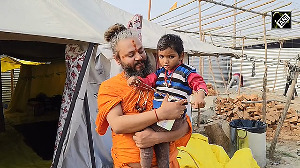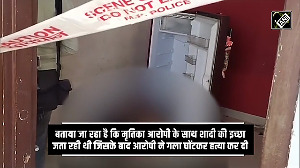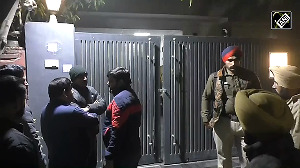Naturally, the talks made little headway and broke up halfway in acrimony. The United States has agreed to cap the farm subsidies at $17 billion a year, which is better than its earlier offer of $22.5 billion. Brazil and India, representing the poorer countries, wanted the cap at less than $15 billion.
The European Union has offered overall tariff cuts of 50 per cent on agriculture products, which the United States finds inadequate. India and Brazil suspect that the tariff cuts would be restricted to some items and leave out the "sensitive" products.
India is not ready to cut tariffs on 20 per cent of the items and is offering only minimal cuts that will effectively shield 95 per cent of its imports of agriculture products, feel the US and EU.
On industrial tariffs, India and Brazil feel that it is unfair of richer countries to expect any cuts in return for cuts in farm subsidies. The richer countries are ready to offer 10 per cent cuts in industrial tariffs in return for a tariff ceiling of 15 per cent for developing countries and 18 per cent for the least developed countries. India and Brazil want the ceiling at 30 per cent.
These are well-known positions. Undeterred by the failure at Potsdam, Pascal Lamy, the Director General of the World Trade Organisation, said its 150 member countries would meet at Geneva next month to take the negotiations forward with the hope of arriving at an agreement by August that would help conclude the Doha Development Round by the end of this year.
Last year, Lamy had suspended the negotiations, frustrated by the rigid stand of the parties. The talks recommenced this year amid assurances from major powers that they would show greater flexibility.
But that has not happened so far and there is little to hope that by next month the position will improve. Why the trade ministers meet at all without being ready to make any concessions is a question that defies an answer.
These days, the telecommunication and video conferencing facilities are so good that the ministers can very well discuss whatever they want without travelling to any other place.
No doubt, personal equations need to be improved and can sometimes help in arriving at solutions to knotty problems. But when there is no intention to negotiate, what is the point in meeting?
For the past three years, Kamal Nath has travelled abroad any number of times only to keep repeating what he had said three years ago. Up to a certain extent, it is necessary to use the international conferences and meetings to get due media coverage for one's point of view, build opinions in one's favour and not get isolated. But, beyond a point it seems pointless.
If Kamal Nath devotes half the time to travelling within the country to meet any number of small exporters and understand their problems, he would be able to bring significant improvements in the system and help the exporters reduce transaction costs.
As matters stand, corruption is rampant in the licencing offices and few exporters have the necessary confidence that they can get anything done without engaging touts or greasing the channels.







 © 2025
© 2025